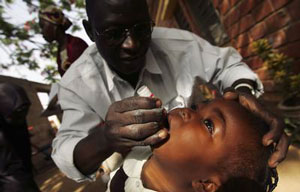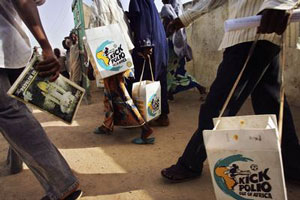 |
 | |||||||||||||
Polio Rebounds in Nigeria
|
 |
||||||||||||
|
It all seemed so possible in 1988.
That was when the World Health Organization and other international health groups set the year 2000 as its target to totally eliminate polio from the face of the Earth, later amending the date to 2005. Polio eradication back then seemed ambitious but doable. Health groups were still awash in the glow of eradicating smallpox a decade earlier, and a new, cheap polio vaccine that could be widely distributed over rural areas enabled easier-than-ever mass inoculations. Hope was in the air.
But 2005—the 50th anniversary of the approval of Jonas Salk's famous vaccine—has arrived with polio far from eradicated. In fact it's on the march again, with hundreds of new cases in northern Nigeria alone last year; infections from Nigeria have spread, reaching as far as Indonesia. But the reason polio has endured is not because of the tenacity of the virus. It's politics—post 9/11 politics.
I saw this for myself during a visit to Nigeria's regional capital of Kano last month. Kano is a dusty and historic crossroads that once marked the beginning of trade and civilization for trans-Saharan travelers. During the harmattan season, the brown earthen buildings are sandblasted with a fine yellow dust that obscures the sun. Dominated by Muslim leaders, Kano is home to a virulent mistrust of the West and, at times, of the Nigerian central government in Abuja because of its emerging ties to the United States and Europe.
As we talk in the doorway to his office (he was too nervous talking to me to let me in to sit down), one toddler rocketed in from the hallway on his hands and knees, interrupting the doctor's comments; the child looked old enough to walk, except that his legs were noticeably thin and curled up behind him unnaturally, dragging uselessly on the floor. His harried mother soon dashed in and scooped him up to take him out of the office with apologies. The doctor locked eyes with me, his eyebrows raised, with an implied 'see, this is what I'm saying' look.
What brought us to this pass is this: Nigeria, long a polio hot spot, ended its polio vaccination program in 2003 in a colossally misguided protest of everything Western after the invasions of Afghanistan and, especially, Iraq. Religious leaders in Nigeria's predominantly Muslim north, twisting news reports about inadvertent contamination in some vaccinations, began preaching in mosques and market squares that polio vaccines were a Western plot to sterilize Muslim women, a plot by the same devious West that had just declared war on the Islamic world with its invasions of sovereign Muslim states.
And so, for 11 months in 2003 and 2004, polio vaccinations in northern Nigeria were suspended. Eleven months was all it took for the virus to not only gain a renewed foothold in Nigeria, but to spread to 10 other African nations that had previously wiped out the disease. WHO leaders feared a renewed global outbreak due to the suspensions, and undertook a lobbying campaign to restart the critical inoculations. They have now resumed, but in Kano it's too little, too late for far too many people.
"This is Umar, my youngest boy," Aminu says, crawling over to his son, who can only crawl himself. "He's got the polio too. Poor son, poor son." But he laughs as he speaks and props up Umar with joy, coo-cooing him and trying to get a response. But Umar is remarkably quiet and dour for a two-year-old and merely totters in his father's grip.
The tragedy of such scenes is made worse by considering how simple the actual administration of polio vaccine is. Two drops in the mouth from a small vial are all it takes to inoculate a child. Two simple drops in Umar's mouth 18 months ago would have spared him a lifetime of pain and difficulty.
He laughs sadly.
© Chris Hondros
Dispatches are brought to you by Canon. Send Canon a message of thanks. |
|||||||||||||
Back to May 2005 Contents
|
|




